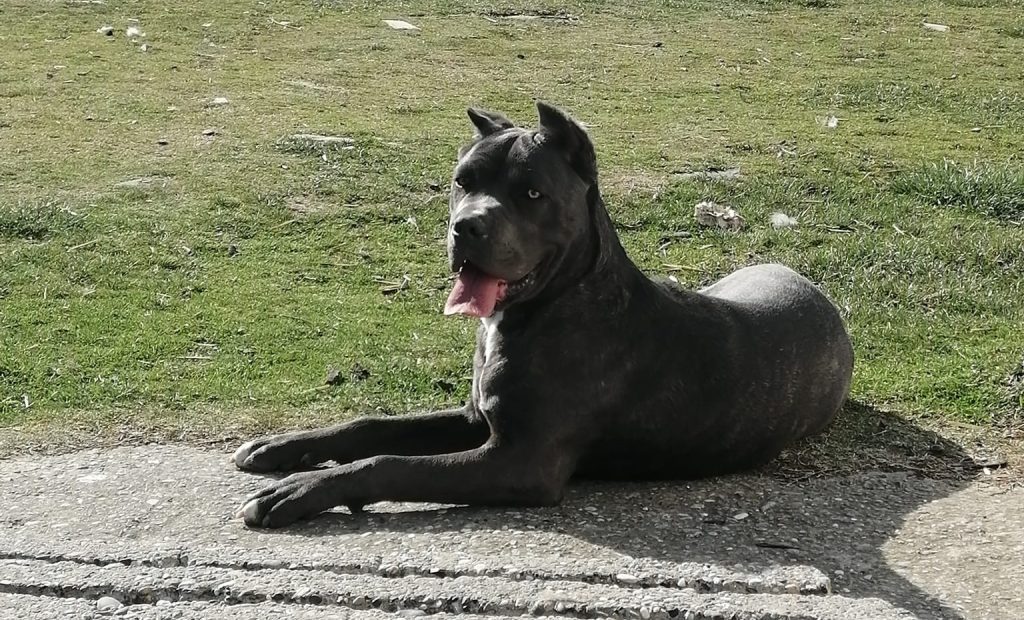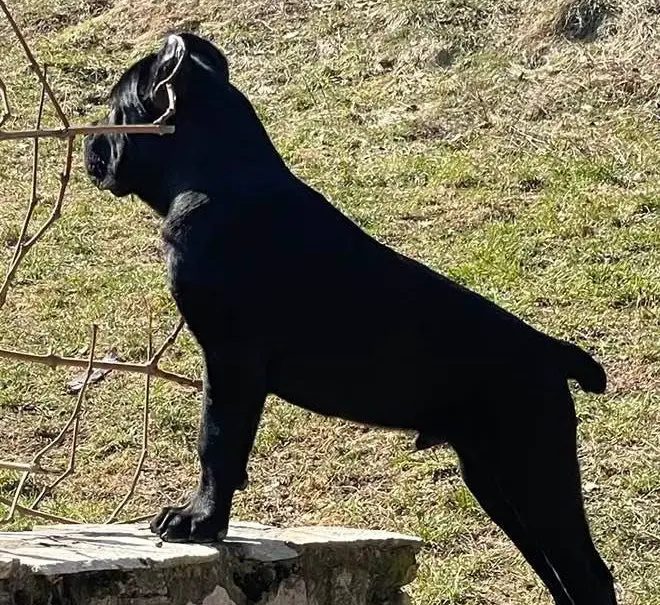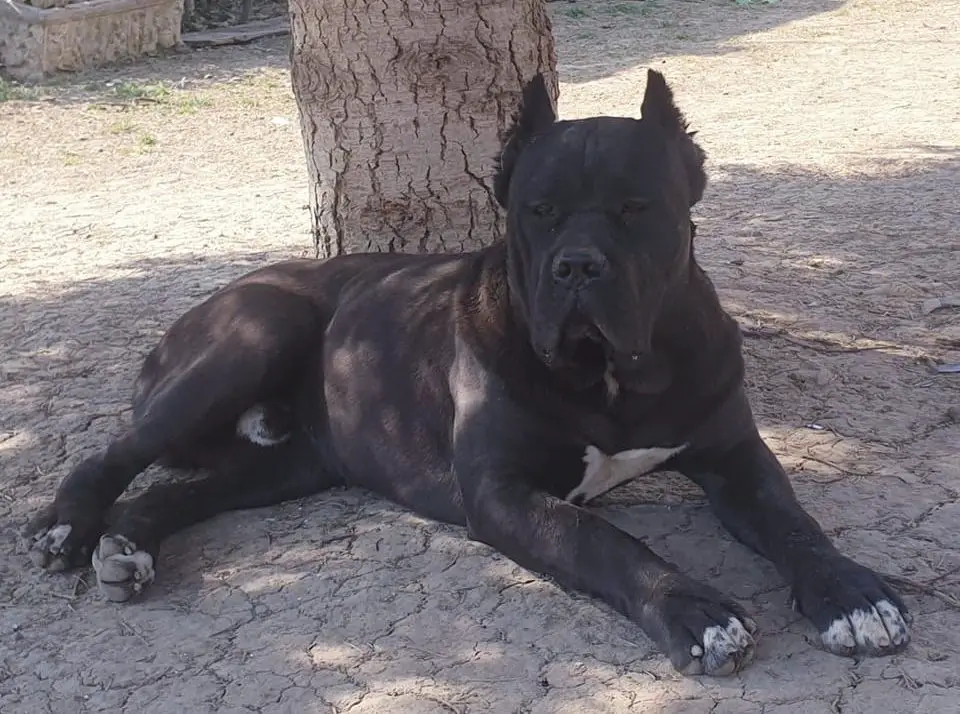How long after eating do Cane Corso poop? After your Cane Corso is done eating their meal, it is likely that they will need to go out to do potty. But, how long after?
Each Cane Corso has a different potty schedule. However, there is a way to predict approximately when your Cane Corso will need to go out and poop.
So, if you want o know how long after eating will a Cane Corso poop, read on as I go into details.
Key Takeaway
- Cane Corsos, like most dogs, typically poop within 30 minutes to an hour after eating as the act of eating triggers a reflex to defecate.
- Cane Corsos, like most dogs, typically poop between 1 to 5 times a day, depending on their diet, age, and health.
- While it varies for each dog, a Cane Corso may need to defecate after each meal as the act of eating can trigger a reflex to poop, but it’s not unusual for some dogs to wait about half an hour after eating before they go.
- You should let your Cane Corso out to poop approximately 30 minutes to an hour after eating, as this is typically when the act of eating triggers a reflex for dogs to defecate.
How Long After Eating Do Cane Corso’s Poop?

Cane Corso puppies usually poop five to fifteen minutes after eating whereas a grown-up Cane Corso will need to poop within thirty to forty-five minutes after they are done eating their meal. Some Cane Corso’s will go to the bathroom earlier, but most of them will poop within the forty-five-minute time frame.
As a pet parent, you will need to learn the potty schedule of your Cane Corso. By learning their potty schedule, you will avoid messy accidents in the home.
While each Cane Corso is a little different, most of them will go potty within 45 minutes after finishing their meal.
This gives the meal enough time to travel through its digestive system. However, if your Cane Corso has a faster-than-normal metabolism, it might need to go poop sooner. That’s why it’s important to measure the time for a week and calculate the average time.
In some rare cases, it could take a Cane Corso more than 45 minutes to go potty.
It really isn’t silly to learn about the bowel movements of your Cane Corso. It will help you learn when your Cane Corso needs to go poop and will help a lot with the potty training.
When you first bring your Cane Corso home, it is a good idea to take them outside five to ten minutes after they finish their meal. By doing so, you will avoid messy accidents in the home.
Cane Corso is a dog of the habit. So, once you train them to go potty after they finish eating, they will stick to this schedule for most of the time.
This goes for all meals. If you are feeding your pup three meals a day, this means you will need to take them out to the bathroom after each meal.
How Often Do Cane Corso Poop?

On average, an adult Cane Corso will defecate two to three times per day. Puppies, on the other hand, need to use the bathroom three to five times a day. However, this can vary depending on the individual dog’s diet and activity level.
Some Cane Corsos may only need to go once a day, while others may need to go more frequently. Puppies usually need to go even more often, as they’re still growing and their digestive systems are still developing.
As a Cane Corso puppy owner, you may be wondering why your pup seems to poop more often than an adult dog. There are actually a few reasons for this.
First of all, puppies have smaller stomachs and intestines than adult dogs. This means that they can’t hold as much food in their system before they need to eliminate it. Puppies also have immature digestive systems, which means that they don’t absorb nutrients from their food as well as adults do.
Finally, puppies simply eat more frequently than adults since they’re growing so quickly! All of these factors combined result in more frequent potty breaks for your little one. Luckily, this is only temporary – as your pup grows and matures, its digestive system will become more efficient and it will need to poop less often.
As Cane Corso ages, its metabolism naturally slows down. This means that they can’t digest food as quickly, which results in fewer and smaller bowel movements. Additionally, older dogs tend to drink less water than when they were puppies, which can further decrease the pooping frequency says Beco Pets.
Does My Cane Corso Need To Go Poop After Each Meal?

Yes, your Cane Corso will need to go poop after each meal, regardless of whether they are eating once a day or three times a day. You can remind them to drink some water after eating so they can do both number one and number two while being outside.
There are a few scientific explanations for why dogs tend to poop after each meal. One theory is that it’s a way of expelling toxins from their system. Another possibility is that defecating helps them digest their food more efficiently. Whatever the reason, it’s clear that dogs have evolved to take advantage of this post-meal potty break!
It is best if you implement this routine while your puppy is still young. In time, they will learn that after each meal they need to go out and poop or pee.
However, sometimes, your Cane Corso won’t be able to poop after each meal. But, this still means that you need to take them out after eating.
Cane Corso needs to poop almost every day. So, make sure to give them some time to wander around outside and finish their business. If for some reason they haven’t pooped after eating two or three meals, make sure to give them some more time to roam around. Do not rush them in any case.
When Should I Let My Cane Corso Out After Eating?
In general, you should let your Cane Corso out thirty to forty-five minutes after each meal. However, you will need to learn the signs that your Cane Corso gives when they need to use the bathroom.
Some dogs might need more than forty-five minutes after eating to go to the bathroom. That is why it’s important to learn the signs that they will give you when it’s potty time.
When your Cane Corso starts to show some signs that they need to go potty, just let them out right away. The most common sign that your Cane Corso will give when they need to go poop is standing in front of the door, maybe even scratching the door.
While outside, do not try to rush them as they might not be able to go potty right away. Leave them to roam for five to ten minutes. If you rush them, they might not be able to go potty and it is likely that an accident will happen inside the household.
What If My Cane Corso Doesn’t Poop After Eating For a Few Days?
For most of the days, your Cane Corso will need to poop every day. However, sometimes, they might not be able to go potty each day and there are some reasons for that.
A sudden change in their diet might contribute to constipation. So, if you have recently changed their diet and you notice that your Cane Corso is not pooping each day, it is time to reconsider their diet.
A fiber-rich diet and proper hydration will ensure that your Cane Corso is pooping each day.
Hydration is also very important when it comes to a regular pooping schedule. A dehydrated Cane Corso will not poop after eating. If for some reason your dog is not showing interest in drinking water, it is time to visit the veterinarian.
Always keep in mind that fiber, water, and regular exercise are necessary to help your Cane Corso keep a healthy digestive tract throughout their lifetime.
Not being able to poop can be something as little as adding something or removing something from their diet. On other hand, it could be something serious.
My advice would be to wait for a few days and monitor the situation. If your Cane Corso is not pooping for more than three days, schedule an appointment with your veterinarian.
FAQs
Q: Should I be concerned if my Cane Corso doesn’t poop right after eating?
A: It is not unusual for a Cane Corso to not poop immediately after eating. However, if your dog consistently doesn’t poop within 24 hours of eating, it may be a sign of constipation or other health issues. In such cases, it is recommended to consult with a veterinarian.
Q: What can I do to help regulate my Cane Corso’s bowel movements?
A: To help regulate your Cane Corso’s bowel movements, you can try the following:
- Ensure they have a balanced diet with high-quality dog food.
- Provide plenty of fresh water to stay hydrated.
- Establish a regular feeding schedule.
- Make sure they get regular exercise to promote digestion.
- Consult with a veterinarian for any specific dietary or health recommendations.
Q: Are there any specific foods that can help with my Cane Corso’s digestion?
A: Yes, there are certain foods that can aid in digestion for Cane Corsos. High-fiber foods like pumpkin, sweet potatoes, and brown rice can help regulate and soften their stool. However, it is essential to introduce new foods gradually and in moderation, as sudden dietary changes can upset their stomach.
Q: Can stress or anxiety affect a Cane Corso’s bowel movements?
A: Yes, stress and anxiety can have an impact on a Cane Corso’s bowel movements. Just like humans, dogs can experience digestive issues when they are stressed or anxious. It is important to create a calm and safe environment for your dog and manage any triggers that may cause stress.
Q: What should I do if my Cane Corso experiences diarrhea?
A: If your Cane Corso has diarrhea, it is essential to monitor their hydration and overall condition. You can try withholding food for 12 to 24 hours, but make sure they have access to plenty of water. If the diarrhea persists for more than 24 hours or if other concerning symptoms arise, consult with a veterinarian.
Q: Can I train my Cane Corso to poop on command?
A: Yes, it is possible to train a Cane Corso to poop on command using positive reinforcement techniques. By associating a specific command or cue with the act of eliminating, you can gradually teach your dog to go potty on command. Consistency, patience, and rewards are key components of this training process.
Q: How can I prevent my Cane Corso from eating their own poop?
A: Coprophagia, the act of eating feces, is not uncommon in dogs, including Cane Corsos. To prevent this behavior, you can:
- Ensure your dog’s diet is nutritionally balanced and they are getting appropriate nutrients.
- Keep the yard or living area clean to reduce access to feces.
- Supervise your dog while outside to discourage them from eating poop.
- Consider using deterrent sprays or additives to make the feces less appealing to them.
- Consult with a veterinarian if the behavior persists or worsens.
Q: Are there any health conditions that can affect a Cane Corso’s bowel movements?
A: Yes, certain health conditions can impact a Cane Corso’s bowel movements. Conditions such as gastrointestinal disorders, food allergies or sensitivities, parasites, and infections can all cause changes in their stool patterns. If you notice persistent abnormalities in their bowel movements, it is best to consult with a veterinarian for proper diagnosis and treatment.
In Conclusion
Most Cane Corso’s will poop between five and fifteen minutes after each meal.
However, some may take up to forty-five minutes which is perfectly normal.
Each Cane Corso is different and only by monitoring you will learn exactly how much time it takes for your pup to process the food.




